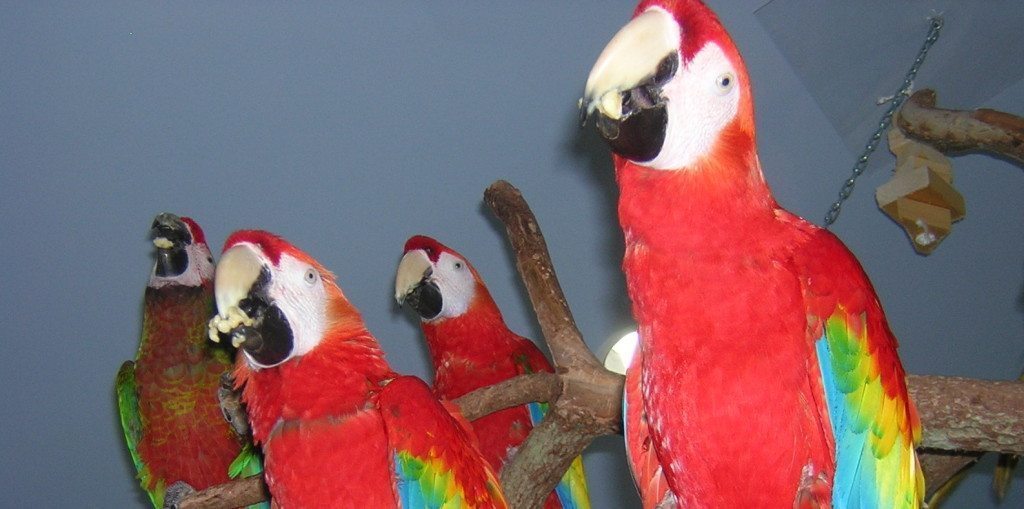 Wagbrag is excited to now provide information and helpful tips about birds to our readers. Matt Smith, Founder and Executive Director of Project Perry, a nonprofit parrot and exotic bird sanctuary based in Virginia, outlines below several factors that people should consider before getting a bird as a pet. Check back with Wagbrag soon for more information about birds as pets.
Wagbrag is excited to now provide information and helpful tips about birds to our readers. Matt Smith, Founder and Executive Director of Project Perry, a nonprofit parrot and exotic bird sanctuary based in Virginia, outlines below several factors that people should consider before getting a bird as a pet. Check back with Wagbrag soon for more information about birds as pets.
Is a Bird Right For You?
Parrots and other exotic birds kept as pets represent the third most popular animal living alongside humans in captivity, just behind cats and dogs. However, there are many reasons these highly intelligent and social wild animals may not be appropriate for every household. Meeting their complex needs proves to be a time-consuming and demanding experience for even the most bird savvy and experienced guardian. However, should you be up to the task of sharing your life with these incredible creatures, please consider adoption!
Lifespan and Re-homing
Birds commonly kept as pets can range in size from the smallest Finch to the largest Macaw, with several hundred species to choose from. Generally speaking, the larger the bird is, the longer the lifespan. Large Macaws and large Cockatoos may live up to 80 years in captivity! Age of bird and lifespan are major considerations when making a decision to adopt one of these majestic animals. Lifespan is one of the challenges presented to those who wish to keep them as pets. With most species living at least two or three decades, and others far more, birds will often outlive their original guardian. Birds may then find themselves in a shelter setting, needing a new home because their future beyond their original guardian had not been well thought-out. It is important that you include your desired arrangements for your bird in your Last Will & Testament, with detailed plans as to who will care for the bird.
Housing
Hopefully someday the image of a single parrot living in the back corner of a living room while his/her guardian is at work all day will no longer be acceptable in our society. There is a growing movement of progressive thinkers who think “outside the cage”! A common practice that is very damaging to a bird’s well-being is the deprivation of flight and flock. Flight is what makes a bird a bird. It fulfills their need to expend energy in a positive way. Birds are also incredibly social animals with the desire to be a member of a flock and have a special mate within that flock. In order to fulfill flight and flock for their pet birds, many guardians are turning to bird-specific rooms within their house or even indoor/outdoor aviaries. Not only is it more enjoyable to visit with your birds in a stimulating and large environment, but the cost to bird-safe a room is often less than the purchase of a traditional cage.
Diet
Parrots most certainly should not eat just bird seed – it is detrimental to their health. It is akin to raising a human child on potato chips. Unfortunately, many big-box pet stores carry seed-based and low-grade foods that are lacking proper nutrition. If you’re considering caring for a bird, a varied diet is essential. You may also want to consider using human-grade ingredients and/or premium pet products only. Fresh fruits, vegetables, seeds, grains, nuts and pellets help make up a varied diet. Drinking water should be replenished at least once per day and you should give the water bowl a good scrubbing with antibacterial soap every day, no exceptions – otherwise bacteria will build up in the bowl and could lead to illness.
Veterinary
All bird guardians should have access to an avian certified veterinarian. Avian medicine is a very unique and complex specialty within the veterinary field. An experienced avian veterinarian should be able to diagnose and treat conditions that a non-avian veterinarian may not understand. If you only have access to a non-avian veterinarian, be sure he/she is able to consult with or refer you to someone else, should a complex medical condition arise. Annual well-bird check-ups are recommended, which will cost a couple hundred dollars. Should your bird(s) get sick, it may run into the many hundreds and even thousands of dollars.
Enrichment
In addition to offering your bird flight and flock, there are other ways to enrich their lives in captivity. Toys come in various styles and are made of different materials – sometimes it means offering many choices to your bird, and in the process discovering what your bird finds stimulating and enjoyable. Soft wood such as pine is popular with birds that are big chewers. Paper is very enjoyable for the bird that likes to shred it. Even mechanical or puzzle style toys can be offered to the more inquisitive birds that enjoy figuring out how things work – or come undone. Toy purchases can run into the hundreds of dollars per year and should be made of safe and chemical-free materials. An enjoyable toy for your bird means one that is often played with and quickly destroyed!
Birds make incredible pets, and can provide a long period of companionship to their guardians. The decision to adopt a bird must be carefully considered in advance, weighing many of the factors discussed above.
Authored By: Matt Smith – To Learn more about Matt and Project Perry please visit their website at: www.projectperry.com
Article Photo: Courtesy of Matt Smith and Project Perry









